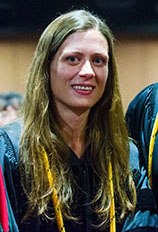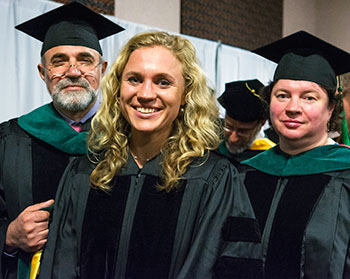Student Profiles
Amy Dear-Ruel, MD
 Amy Dear-Ruel knew she would be on the move during her third year of medical school. As a rural track student, she chose to move to a new Colorado town about every three weeks, and, unless she got creative, would not see her husband and toddler for weeks on end.
Amy Dear-Ruel knew she would be on the move during her third year of medical school. As a rural track student, she chose to move to a new Colorado town about every three weeks, and, unless she got creative, would not see her husband and toddler for weeks on end.
“The only way to stay together as a family was to give up our house,” she says. “My husband quit his job, and we bought a 20-foot camper.”
Her husband, Jerramy, and daughter, Cheyanne, made the most of the adventure, going on hikes, seeing museums and acting like tourists while she worked. Even when she was in the Denver area for three months, they stayed in a campground in Golden.
“It got really cold that winter,” she says. “I was literally kicking my way out of the trailer some mornings because there was ice on the outside.”
Rural physicians opened their homes on weekends so the family could relax someplace warm.
“People definitely tried to help out,” she says.
Living in extreme conditions is not new to Dear-Ruel, who grew up in Colorado Springs, and moved to Montana in 2001 for college because she was looking for a place with mountains but fewer people.
She worked six seasons at Glacier National Park as a forestry technician, and joined the Peace Corps in Bulgaria with her husband, where they were assigned to work at a national park.
“But then the mayor of the town found out that I play piano, so he went out and bought a piano, and when I got there, they told me, ‘You need to teach the town how to play.’”
Dear-Ruel soon had 50 students of all ages.
“It was a good way to fit in quickly,” she says, “and it’s the one part of Bulgarian that I can say I’m fluent in.”
Before leaving for Bulgaria, she finished her degree in Recreation Management at University of Montana, but after returning knew she was interested in a health care career.
“While we were in Bulgaria, I did a big project with several rural hospitals there and Project Cure. We brought $2 million of medical supplies to Bulgaria. I knew I wanted to work internationally, maybe in disaster relief or something.”
The couple also traveled to South Africa to volunteer in a clinic, where she worked in emergency care.
“I also went with community health workers to visit bed-ridden patients in the townships. These were people who couldn’t leave home because they had complications from TB or AIDS. We’d make sure they got to the hospital for appointments or I would do things like give them baths. Visiting patients in their homes was the best part.”
When the couple returned to the U.S. her husband took a job at a bison ranch south of Laramie, and she joined a road crew where she drove a steam roller. Dear-Ruel also started her master’s degree in public health, finished her pre-med courses and volunteered on the Blackfeet Nation Reservation hospital.
“I guess I’m willing to try anything,” she says.
Dear-Ruel, 31, has spent most of her fourth year of medical school in Montana. After graduation she’ll perform her residency with the Family Medicine Residency of Western Montana first in Missoula, then in Kalispell.
Eventually she hopes to work at the Blackfeet Community Hospital, which fits with the couple’s plan to start a bison ranch in East Glacier Park.
“I knew from the start what hospital I wanted to work at and what I wanted to do,” she says. “I liked a lot of other specialties, but what Family Medicine doctors do is everything.”
The Blackfeet Community Hospital is run by Family Medicine physicians and she hopes to work shifts throughout the hospital including OB-GYN and emergency. She remains interested in disaster relief so work abroad isn’t out of the question.
Fortunately, her family is as up for adventure as she is.
“My daughter is very adaptable. I suppose that’s been forced on her. When she was 3 or 4 years old, she looked at me and said ‘Mommy, I’m so happy we get to move around and do fun things.’ I would feel terrible if she hated it.”
Anna Mackin, MD
 Anna Mackin’s path to CU School of Medicine started in Russia with a dislike of a high school geography class.
Anna Mackin’s path to CU School of Medicine started in Russia with a dislike of a high school geography class.
When a friend told her she could avoid an exam in the subject if she took an English language test to qualify to study abroad, she jumped at the chance. A few months later, she was bound for Tulsa, Okla., from Samara, Russia, southeast of Moscow.
“They didn’t tell us where we were going. We found out in the airport,” she says. "The foreign exchange experience became the most memorable year in my life. I am so glad I did it!"
She first saw Colorado that year when her host family took her on a ski trip.
“I loved it. I hadn’t even been to Boulder, but I applied to CU. I thought why not? (CU has) a good medical school and strong science programs.”
Mackin, 26, is continuing a family tradition of practicing medicine; her father and brother are orthopedic surgeons and her mother is a clinical pathologist.
“I liked other things, but medicine is such an amazing profession. It’s so diverse. What my parents do is very different. I knew that if I went into medicine I was certain to find a specialty that would fit me.”
On rotation in Fort Collins during her third year and considering an internal medicine specialty, Mackin ran into fellow student Lauren Mehner, who recommended taking ophthalmology as a subspecialty class.
“The first two years I liked everything; when Lauren said she learned so much in ophthalmology I took the rotation and loved it. I love the variety of clinic and surgery, and I love that the clinic is so dynamic and exciting. It’s very hands on and the surgeries are so delicate. You really get to make a connection with patients – especially when they have chronic diseases.”
Technological advances in the field also attracted her.
“Cataract surgery today is very safe and effective. There’s also been a revolution in the treatment of age-related macular degeneration (AMD) in the past few years. With wet AMD, people used to just lose their vision, and we could not offer any effective treatments. Now we have anti-VEGF medication injections that have dramatically improved care. With dry AMD, there’s still not a really good treatment but I think there will be soon. “
New treatments made possible by stem cell research at the Gates Center for Regenerative Medicine under the leadership of Dennis Roop, PhD, offer opportunities for better care.
“Dr. Roop and his colleagues are working on using stem cells to regenerate tissues. It could be possible in the future that if a patient had a severe chemical burn but a portion of the limbus remained intact you could harvest the limbal stem cells and make a new cornea. It’s pretty amazing.”
Mackin, who married her college boyfriend during winter break of her third year of medical school, is grateful to stay in Colorado. She matched at University of Colorado Hospital Ophthalmology Residency Program and her training will include rotations at Rocky Mountain Lions Eye Institute, Denver Health, the Denver Veteran’s Administration Hospital and Children's Hospital Colorado. Her intern year will be spent at St. Joseph Hospital in Denver.
When asked what surprised her most about medical school, she said she hadn’t realized how valuable interpersonal skills would be. “You’ve got to learn the science side, but there’s so much more. Communication skills and empathy are so important. I knew that, but I didn’t appreciate the extent."
She encourages incoming students to remember the big picture when school is hard.
“Think about why you’re doing this and the difference you can make. It makes it so much more worth it. Sometimes all your friends are out having fun, but you have to be up at 4 a.m. tomorrow to pre-round. So think about helping your patients and the excitement and joy of that experience.”